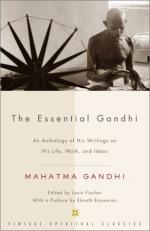|
This section contains 661 words (approx. 2 pages at 400 words per page) |

|
Gandhi Summary & Study Guide Description
Gandhi Summary & Study Guide includes comprehensive information and analysis to help you understand the book. This study guide contains the following sections:
This detailed literature summary also contains Topics for Discussion and a Free Quiz on Gandhi by Louis Fischer.
GANDHI - HIS LIFE AND MESSAGE FOR THE WORLD by Louis Fischer is a biography of the life of Mahatma Gandhi, known throughout the world as the Father of India. The narrative chronicles his story from his birth as the fourth and last son of his father, a government official, and his beloved mother who was illiterate but a devout follower of Hinduism. His mother, who he referred to as a saint, died when he was away in London at law school. He was not notified of her passing since the family knew he would be distraught.
Gandhi's life took a huge turn from which it never returned when he is offered a position as a lawyer in South Africa. He had not been successful as a lawyer in Bombay because he was too shy to speak up in court. After experiencing discrimination first-hand, he found his voice. He spoke before a large gathering of Indians and Moslems working as indentured laborers in South Africa. His intent was to lift these people up and encourage them to stand up against discrimination. Gandhi's view was that discrimination could be overcome by a two-fold approach: exalting the individual who is being discriminated against while appealing to the fairness of the discriminator. Gandhi worked tirelessly to forge a better life for his countrymen who lived and worked in South Africa. He stayed in South Africa over twenty years and realized many successes in his goal to help his people.
When Gandhi returned to his native India, he was met by a variety of challenges but did not hesitate to take them on. During these difficult times, he promoted civil disobedience marches for which he was assaulted and even jailed. He believed in only non-violent protest, but since he was a man of action—a karma yogi—he had no reluctance in voicing his feelings and fasting—coming close to death several times—to bring attention to his cause. Through hard work, unrelenting self-sacrifice, years of frustrating negotiations, and always a devout love of God, Gandhi was finally able to orchestrate an agreement between the British, Moslems and Hindus for an independent India. The Moslems fought and won a separate Pakistani state which frightened Gandhi who had always advocated for a united India.
As a young man born in a Hindu family, he was raised to believe and adhere to the Indian caste system. As he grew older and more spiritual, he saw the debilitating effect that such practice had on not only the "untouchables" but on the soul of India itself. He made the unfair treatment of the untouchables one of his main causes in his later years. He embarked on his most famous fast known as the Epic Fast for the cause of the untouchables. Leading by example, he invited untouchables to live with him and even adopted an untouchable girl.
Throughout his life with all the risks and trials he endured, his strength was derived from the God he loved and worshiped daily. His belief that by giving up worldly possessions, attaining desirelessness, he would become pure and one with God. He felt that praying in jail made the jail a temple. He was content and happy to have nothing in life. He would visit the poor and live with them. He did not want to be a holy man, which did not stop people from worshiping him. Although he secured freedom for India, he wanted no role in the new government. The millions who worshiped him viewed him as superior to a government official—he was the Father of India. He was assassinated in January 1946. The world wept—from the poor to leaders from all over the world. The little brown man in the loin cloth who wanted nothing for himself showed the world what selfless love was. He did not fear death knowing that he would be with God forever.
Read more from the Study Guide
|
This section contains 661 words (approx. 2 pages at 400 words per page) |

|



